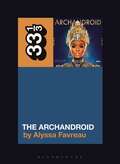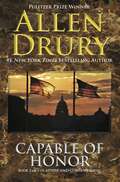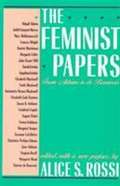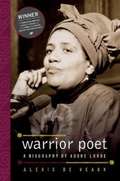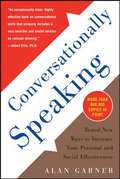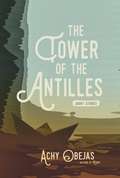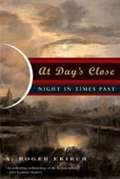- Table View
- List View
Janelle Monáe's The Archandroid (33 1/3 #159)
by Alyssa FavreauIn Janelle Monáe's full-length debut, the science fiction concept album The ArchAndroid, the android Cindi Mayweather is on the run from the authorities for the crime of loving a human. Living in 28th century Metropolis, Cindi fights for survival, soon realizing that she is in fact the prophesied ArchAndroid, a robot messiah meant to liberate the masses and lead them toward a wonderland where all can be free. Taking into account the literary merit of Monáe's astounding multimedia body of work, the political relevance of the science fictional themes and aesthetics she explores, and her role as an Atlanta-based pop cultural juggernaut, this book explores the lavish world building of Cindi's story, and the many literary, cinematic, and musical influences brought together to create it. Throughout, a history of Monáe's move to Atlanta, her signing with Bad Boy Records, and the trials of developing a full-length concept album in an industry devoted to the production of marketable singles can be found, charting the artist's own rise to power. The stories of Monáe and of Cindi are inextricably entwined, each making the other more compelling, fantastical, and deeply felt.
Capable of Honor (Advise and Consent #3)
by Allen DruryFirst published in 1966. It is one of the most fundamental questions facing America today: How justifiably, or irresponsibly, do the volatile and unbiased American media—press, television and radio—attempt to interfere with, and control, the political process and the foreign policy of the nation? In a hotly fought Presidential primary, the news media fractures along ideological lines, supporting and distorting the candidates’ records, manipulating the news rather than covering it. Capable of Honor, the third novel in the grand, bestselling Advise and Consent saga, is a compelling blockbuster that shines a harsh and revealing spotlight on how the media shapes the news, guides public opinion, creates policy—and tries to shape history itself. FROM THE MASTER OF SPELLBINDING POLITICAL FICTION, AUTHOR OF ADVISE AND CONSENT.
Preserve and Protect (Advise and Consent #4)
by Allen DruryDrury describes the chaos that overtakes America and the world with the suspicious death of the President just after his renomination. His death leaves the incumbent party without a candidate or a clear-cut way of selecting one. Against a backdrop of national and international chaos, Drury examines the motives and ambitions of a now-famous gallery of political characters. As the novel moves to its dramatic climax, the question of what candidate will be nominated by what groups keeps the future of America and the world hanging in the balance.
The Feminist Papers: From Adams to De Beauvoir
by Alice S. RossiHere are, as Alice Rossi claims in her well-written preface, 'the essential works of feminism, ' published over a period of 200 years. Her introductions to each section are informative and written with nonpolemical grace. -- Doris Grumbach, New Republic
Warrior Poet: A Biography of Audre Lorde
by Alexis De VeauxWinner of the 2005 Lambda Literary Award, the Hurston/Wright Legacy Award, and the Gustavus Myers Outstanding Book Award: the first and "essential" (Choice) biography of the author, poet, and American icon of womanhood, black arts, and survival. During her lifetime, Audre Lorde (1934-1992), author of the landmark Cancer Journals, created a mythic identity for herself that retains its vitality to this day. Drawing from the private archives of the poet's estate and numerous interviews, Alexis De Veaux demystifies Lorde's iconic status, charting her conservative childhood in Harlem; her early marriage to a white, gay man with whom she had two children; her emergence as an outspoken black feminist lesbian; and her canonization as a seminal poet of American literature.
Conversationally Speaking: Tested New Ways To Increase your Personal and Social Effectiveness
by Alan GarnerMore than a million people have learned the secrets of effective conversation using Conversationally Speaking. This revised edition provides more ways to improve conversational skills by asking questions that promote conversation, learning how to listen so that others will be encouraged to talk, reducing anxiety in social situations and more.
The Complete Idiot's Guide to 20th-Century History
by Alan AxelrodWell written history focuses on the twentieth century.
Oh, The Things I Know!: A Guide To Success, Or, Failing That, Happiness
by Al FrankenMore advanced than Robert Fulghum, more fit than Maria Shriver's husband, Oh, the Things I Know! is Franken's commencement address for the 21st century. A cradle-to-grave guide for living, it takes young grads from their first job ("Oh, Are You Going to Hate Your First Job!") through their twenties and thirties ("Oh, the person of Your Dreams vs. the Person You Can Actually Attract!"), into marriage and parenthood ("Oh, Just Looking at Your Spouse Will Make Your Skin Crawl!"), and all the way up to senior citizenship ("Oh, the Nursing Home You'll Wind Up In!"). What does a mega success like Al Franken have to say to ordinary people? "There's no point in getting advice from hopeless failures." Filled with wit, wisdom, observations, and practical tips, this is an easy-to-follow user's manual for human existence. Why travel life's highway all by your lonesome when you can bring Al Franken along?
The Tower of the Antilles
by Achy Obejas"Questions of personal and national identity percolate through the stories in Obejas's memorable short fiction collection, most of which is set in Cuba, the author's birthplace. . . These 10 stories show Obejas's talent, illuminating Cuban culture and the innermost lives of her characters. " --Publishers Weekly "By turns searing and subtly magical, the stories in Obejas' vividly imagined collection are propelled by her characters' contradictory feelings about and unnerving experiences in Cuba. . . For all the human tumult and deftly sketched and reverberating historical and cultural contexts that Obejas incisively creates in these poignant, alarming tales, she also offers lyrical musings on the mysteries of the sea and the vulnerability of islands and the body. Obejas' plots are ambushing, her characters startling, her metaphors fresh, her humor caustic, and her compassion potent in these intricate and haunting stories of displacement, loss, stoicism, and realization. " --Booklist "Obejas's stories demonstrate an acute understanding of being caught between two places and cultures as different as America and Cuba. " --Library Journal "Achy Obejas's collection is about fictional Cuban migrants who never quite escape the land they've left. " --Electric Literature "It's a joy to return to Obejas's work; her prose, crisp, crystalline, and controlled, covering the wide spectrums of anger, desire, longing, and wonder in the face of immigration. . . Obejas sneaks under the skin, revealing emotions tied up at the dock, cuts the rope, and sets them free. The Tower of the Antilles proves, once again, why Achy Obejas is one of the most important Cuban writers of our time. " --The Miami Rail "This summer is the perfect opportunity to get to know the work of this Cuban-American writer. The stories collected in her new book tell the story of various Cubas--Cuba throughout the ages, Cuba from different perspectives, but always Cuba in all its vibrant, troubled, conflicting beauty. " --Barnes & Noble/B&N Reads, included in"12 Must-Read Indie Books Coming This Summer" Praise for Achy Obejas: "Obejas writes like an angel, which is to say: gloriously. . . one of Cuba's most important writers. " --Junot Diaz The Cubans in Achy Obejas's story collection are haunted by islands: the island they fled, the island they've created, the island they were taken to or forced from, the island they long for, the island they return to, and the island that can never be home again. In "Superman," several possible story lines emerge about a 1950s Havana sex-show superstar who disappeared as soon as the revolution triumphed. "North/South" portrays a migrant family trying to cope with separation, lives on different hemispheres, and the eventual disintegration of blood ties. "The Cola of Oblivion" follows the path of a young woman who returns to Cuba, and who inadvertently uncorks a history of accommodation and betrayal among the family members who stayed behind during the revolution. In the title story, "The Tower of the Antilles," an interrogation reveals a series of fantasies about escape and a history of futility. With language that is both generous and sensual, Obejas writes about existences beset by events beyond individual control, and poignantly captures how history and fate intrude on even the most ordinary of lives.
Families Like Mine: Children Of Gay Parents Tell It Like It Is
by Abigail GarnerWritings from adult children of gay and lesbian parents.
Faith For Beginners: A Novel
by Aaron HamburgerIn 2000 a woman travels with her ailing husband and one of her two gay sons to Israel.
At Day's Close: Night In Times Past
by A. Roger EkirchBringing light to the shadows of history through a "rich weave of citation and archival evidence" (Publishers Weekly), scholar A. Roger Ekirch illuminates the aspects of life most often overlooked by other historians--those that unfold at night. In this "triumph of social history" (Mail on Sunday), Ekirch's "enthralling anthropology" (Harper's) exposes the nightlife that spawned a distinct culture and a refuge from daily life. Fear of crime, of fire, and of the supernatural; the importance of moonlight; the increased incidence of sickness and death at night; evening gatherings to spin wool and stories; masqued balls; inns, taverns, and brothels; the strategies of thieves, assassins, and conspirators; the protective uses of incantations, meditations, and prayers; the nature of our predecessors' sleep and dreams--Ekirch reveals all these and more in his "monumental study" (The Nation) of sociocultural history, "maintaining throughout an infectious sense of wonder" (Booklist).
Murrow: His Life and Times
by A. M. SperberMurrow is the biography of America's foremost broadcast journalist, Edward R. Murrow. At twenty-nine, he was the prototype of a species new to communications--an eyewitness to history with the power to reach millions. His wartime radio reports from London rooftops brought the world into American homes for the first time. His legendary television documentary "See It Now" exposed us to the scandals and injustices within our own country. Friend of Presidents, conscience of the people, Murrow remained an enigma--idealistic, creative, self-destructive. In this portrait, based on twelve years of research, A. M. Sperber reveals the complexity and achievements of a man whose voice, intelligence, and honesty inspired a nation during its most profound and vulnerable times.
